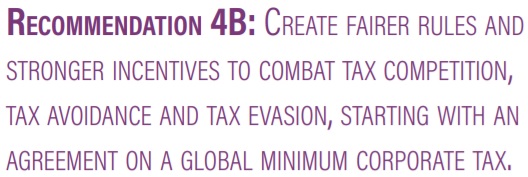Last summer, I provided testimony to the United Nations’ High-Level Panel on Financial Accountability Transparency & Integrity.
I touched on many issues, but my testimony focused on some core principles of sensible taxation.
- Low marginal tax rates on productive behavior.
- No bias in the tax code against saving and investment.
- No corrupt preferences that distort economic choices.
Was my testimony effective? Did the bureaucrats at the U.N. incorporate any of my observations into their conclusions?
Nope. I had no impact. Zero. Nada. Zilch.
That’s my self-assessment after reading the report that the U.N.’s FACTI panel just released. Here are some excerpts.
…even before the present crisis, the international financial system was not conducive to directing investment of resources into sustainable development. …States need robust financing to revitalise transformative action to eradicate poverty, reduce inequalities… Mobilisation of public resources, internationally and domestically, can be enhanced… The Panel proposes a Global Pact for Financial Integrity for Sustainable Development… All taxpayers should pay their fair share, including a minimum global corporate income tax rate on profits… Establish an inclusive and legitimate global coordination mechanism at United Nations Economic and Social Council (ECOSOC) to address financial integrity on a systemic level.
The over-arching goal of the U.N. is to empower governments by weakening tax competition.
There were 14 specific recommendations in the report, each with multiple parts.
Here’s the one that deserves a bit of attention.

This policy, if ever enacted, would have all sorts of negative implications.
Here are four obvious concerns.
- For starters, no jurisdiction would be able to opt for the best-possible tax system of no income tax. So it would be very bad news for places such as Bermuda, Monaco, and the Cayman Islands.
- It also would mean higher taxes in many other places such the report calls for “setting a rate of 20-30% on profits.” So it would be very bad news for places with low rates, such as Ireland, Estonia, and Switzerland.
- Eventually it would mean higher taxes for everyone since politicians, once they have the power, would repeatedly raise the “global minimum tax rate” to extract more money from the economy’s productive sector.
- And once politicians have the power to set minimum tax rates for corporate taxation, it would merely be a matter of time before they adopted the same approach for the personal income tax.
I’ll close by zooming out to address one of the themes in the report.
Over and over again, it asserts that more tax money (the report repeatedly uses euphemisms such as “robust financing” and “public resources”) will translate into faster economic development.
This is a common theme at the U.N., but there’s never the slightest effort to provide any support for this assertion. No data, no evidence, no research, and no examples. It’s what i call the “magic beans” theory of growth.

As I’ve periodically asked, shouldn’t they provide a case study of this approach ever being successful, either now or at any point in history?
But don’t hold your breath.
Here’s a CF&P video that addresses this issue.
P.S. When I read the FACTI report, it reminded me that there’s plenty of waste and fat to cut at the United Nations.
P.P.S. Bureaucrats at the U.N. have asserted that low tax burdens somehow are a violation of human rights. But since those bureaucrats get tax-free salaries, perhaps they should lead by example and surrender a big chunk of their income before coming after the rest of us.



